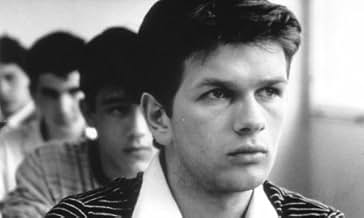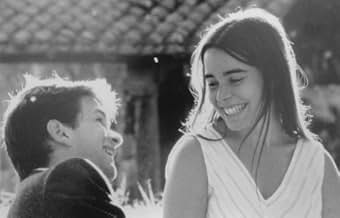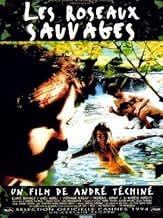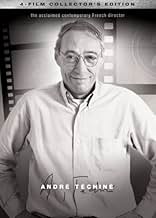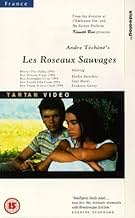Les roseaux sauvages
- 1994
- Tous publics
- 1h 50min
Ajouter une intrigue dans votre langueThe fates of two partners are divided.The fates of two partners are divided.The fates of two partners are divided.
- Réalisation
- Scénario
- Casting principal
- Récompenses
- 8 victoires et 7 nominations au total
Avis à la une
Nevertheless, there is an overall subtlety to the movie, something that makes it light even if the topics are not always light (Francois discovers he is gay and have some problems dealing with it, Henri is a pied noir in France at the end of the Algeria war and is in a delicate situation, not speaking about Serge who loses his brother to that same war and Maite who is somewhat oppressed by her mother who is a die hard communist militant).
It was very refreshing to see. You need to be familiar with the history of Algeria war and the tensions of that time though to fully follow. A film I would recommend to many people.
Techine's direction gives the many strands of this story a great, personal feel - the shoe store scene stands out as an honest depiction of an individual recognizing and trying to accept his sexuality, and attempting to identify other gay people, as a way of lessening isolation, and in an attempt at spontaneously finding some sort of role model. Very thoughtful and very well-made.
The children realistically explore their budding sexuality with all dimensions treated in a straightforward and sensitive manner. The children await the results of their baccalaureate exam, the culmination of French High School education and the key to their professional lives. The natural developmental and educational issues that teenagers face are compounded by the turbulence of the times. And what turbulence surrounds these children! A violent, unpopular, and un-winable war to retain colonial ownership of Algeria strikes directly into this small French village as one child looses his brother and another his homeland. The latter plans bloody revenge against those whom he believes betrayed France until he realizes that Maite, a girl he loves, would be his target. Maite's mother is overwhelmed by guild and institutionalized by fear that her lack of action may have led to the brother's death.
Oh, and there is some great American rock and roll that somehow fits in; it must be that enduring French countryside.
The movie is set in 1962, just at the end of the Algerian War of Independence. To fully understand and enjoy the movie, it's helpful to know the basics. French soldiers were still being sent to Algeria to oppose independence. The OAS was a right-wing group in Algeria and France that wanted to retain French colonial power.
We don't see Algeria in the movie--the action takes place in and around Toulouse, in southern France. The film is a coming-of-age movie for four young adults.
Élodie Bouchez portrays Maïté Alvarez, the only woman of the four. Gaël Morel is François Forestier, Stéphane Rideau plays Serge Bartolo, and Frédéric Gorny portrays Henri Mariani.
The three young men are studying in a boarding school. Maïté's mother teaches at the school. She and her daughter are both Communists, and they believe in Algerian independence.
The movie examines a few weeks in their lives. These weeks are filled with self-discovery and interaction among the four adolescents. Some of the events are profound and will change what happens to them in the future.
We saw the film on DVD. It would work better on the large screen, but it was OK on the small screen. The movie has a solid IMDb rating of 7.4. I thought it was better than that and rated it 8.
Le saviez-vous
- AnecdotesThere are many references in the movie to "The O.A.S.," in conversation, and overheard on radio and television newscasts. OAS - or Organisation armée secrète, literally "Organization of the Secret Army" or "Secret Armed Organization," was a French nationalist terrorist organization during the Algerian War (1954-62), which ended in independence for Algeria in July 1962, which was not only the time setting for this movie, but the Algerian War was also the background conflict that propelled much of the plot of this film. Using armed struggle in an attempt to prevent Algeria's independence, OAS's motto was "Algeria is French and will remain so" (L'Algérie est française et le restera).
- GaffesOne of the songs featured at the party which Maïté and François go to after the movie is "Barbara Ann" by The Beach Boys, which was recorded and released in the fall of 1965, a full three years after the 1962 time setting for this movie.
- Citations
François Forestier: I'm like you, I'm queer, but I haven't met my soul-mate yet. I met someone who doesn't want me. I should give up. That would be smarter. But I'm not smart. I have no chance, but I can't give up. I don't get discouraged. We made love once. Just once. In the beginning. He doesn't want to anymore. Since then I'm like a thief. I steal brief moments... Once I held him tight on my bike. Another time, I slept near him. You have experience. Only you can help me. At my age, did this happen to you? When you liked a boy, what did you do? How did it work?
Monsieur Cassagne: Listen... It was so long ago... I don't want to disappoint you, but I've forgotten. I'm sorry. I have a client waiting. I have to go.
- Versions alternativesShorter TV version released under the title Tous les garçons et les filles de leur âge: Le chêne et le roseau (1994) (TV)
- ConnexionsFeatured in Cinéma, de notre temps: André Téchiné, après la Nouvelle Vague... (1993)
- Bandes originalesAdagio for Strings
by Samuel Barber
Meilleurs choix
- How long is Wild Reeds?Alimenté par Alexa
Détails
Box-office
- Montant brut aux États-Unis et au Canada
- 807 775 $US
- Montant brut mondial
- 807 775 $US
- Durée1 heure 50 minutes
- Couleur
- Mixage
- Rapport de forme
- 1.66 : 1
Contribuer à cette page



